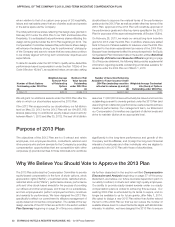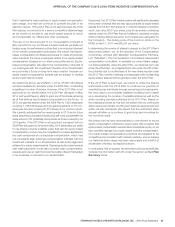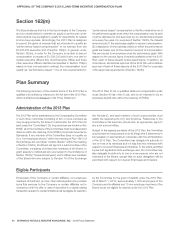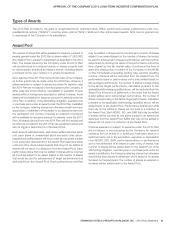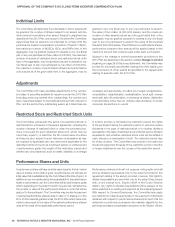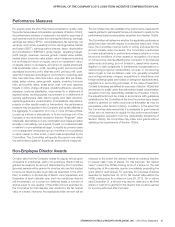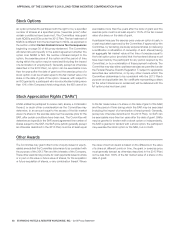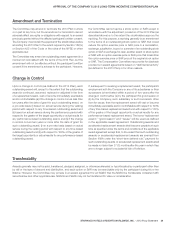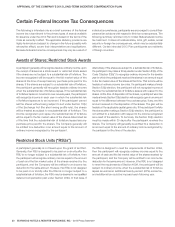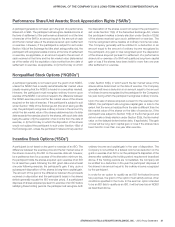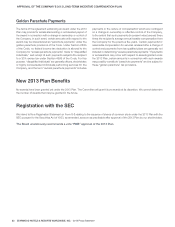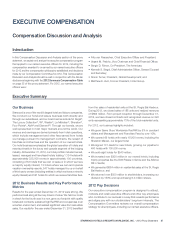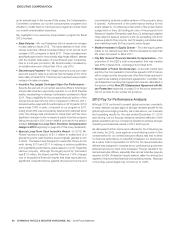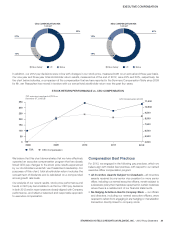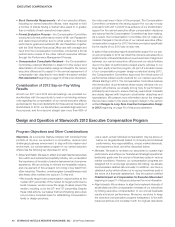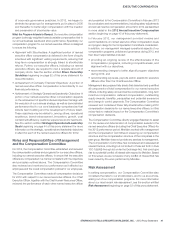Starwood 2012 Annual Report Download - page 37
Download and view the complete annual report
Please find page 37 of the 2012 Starwood annual report below. You can navigate through the pages in the report by either clicking on the pages listed below, or by using the keyword search tool below to find specific information within the annual report.
STARWOOD HOTELS & RESORTS WORLDWIDE, INC.-2013Proxy Statement 31
APPROVAL OF THE COMPANY’S 2013 LONG-TERM INCENTIVE COMPENSATION PLAN
Performance Share/Unit Awards; Stock Appreciation Rights (“SARs”)
A participant generally is not taxed upon the grant of a performance
share/unit or SAR. The participant will recognize taxable income at
the time of settlement of the performance share/unit or at the time
of exercise of the SAR in an amount equal to the amount of cash
and the fair market value of the shares received upon settlement
or exercise. However, if the participant is subject to suit under
Section16(b) of the Exchange Act (the short swing profi ts rule), the
participant will recognize taxable income at the time of settlement
or exercise, as applicable, in an amount equal to the amount of
cash received at that time and the fair market value (determined
as of the earlier of (i) the expiration of six months from the date of
settlement or exercise, as applicable, or (ii) the fi rst day on which
the disposition of the shares would not subject the participant to
suit under Section16(b) of the Securities Exchange Act, unless
the participant makes a timely election under Section83(b))
of the shares received upon such settlement or exercise. The
income recognized will be taxable at ordinary income tax rates.
The Company generally will be entitled to a deduction in an
amount equal to the amount of ordinary income recognized by
the participant. Any gain or loss recognized upon the disposition
of the shares acquired pursuant to settlement of a performance
share/unit or exercise of a SAR will qualify as long-term capital
gain or loss if the shares have been held for more than one year
after settlement or exercise.
Nonqualifi ed Stock Options (“NQSOs”)
A participant generally is not taxed upon the grant of an NQSO,
unless the NQSO has a readily ascertainable fair market value
(usually meaning that the NQSO is traded on a securities market).
However, the participant must recognize ordinary income upon
exercise of the NQSO in an amount equal to the difference between
the NQSO exercise price and the fair market value of the shares
acquired on the date of exercise. If the participant is subject to suit
under Section16(b) of the Exchange Act (the short swing profi ts
rule), the participant recognizes ordinary income in the amount by
which the fair market value of the shares determined as of a later
date exceeds the exercise price for the shares, with such later date
being the earlier of (i) the expiration of six months from the date of
exercise, or (ii) the fi rst day on which the disposition of the shares
would not subject the participant to suit under Section16(b) of
the Exchange Act , unless the participant makes a timely election
under Section83(b), in which event the fair market value of the
shares will be determined on the date of exercise. The Company
generally will have a deduction in an amount equal to the amount
of ordinary income recognized by the participant in the Company’s
tax year during which the participant recognizes ordinary income.
Upon the sale of shares acquired pursuant to the exercise of an
NQSO, the participant will recognize capital gain or loss to the
extent that the amount realized from the sale is different than the
fair market value of the shares on the date of exercise (or, if the
participant was subject to Section16(b) of the Exchange Act and
did not make a timely election under Section83(b), the fair market
value on the delayed determination date, if applicable). This gain
or loss will be long-term capital gain or loss if the shares have
been held for more than one year after exercise.
Incentive Stock Options (“ISOs”)
A participant is not taxed on the grant or exercise of an ISO. The
difference between the exercise price and the fair market value of
the shares covered by the ISO on the exercise date will, however,
be a preference item for purposes of the alternative minimum tax.
If a participant holds the shares acquired upon exercise of an ISO
for at least two years following the ISO grant date and at least
one year following exercise, the participant’s gain, if any, upon a
subsequent disposition of the shares is long-term capital gain.
The amount of the gain is the difference between the proceeds
received on disposition and the participant’s basis in the shares
(which generally equals the ISO exercise price). If a participant
disposes of shares acquired pursuant to exercise of an ISO before
satisfying these holding periods, the participant will recognize both
ordinary income and capital gain in the year of disposition. The
Company is not entitled to a federal income tax deduction on the
grant or exercise of an ISO or on the participant’s disposition of the
shares after satisfying the holding period requirement described
above. If the holding periods are not satisfi ed, the Company will
be entitled to a deduction in the year the participant disposes of
the shares in an amount equal to the ordinary income recognized
by the participant.
In order for an option to qualify as an ISO for federal income
tax purposes, the grant of the option must satisfy various other
conditions specifi ed in the Code. In the event an option intended
to be an ISO fails to qualify as an ISO, it will be taxed as an NQSO
as described above.



